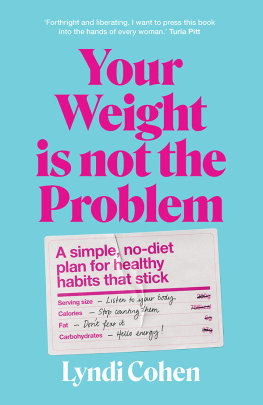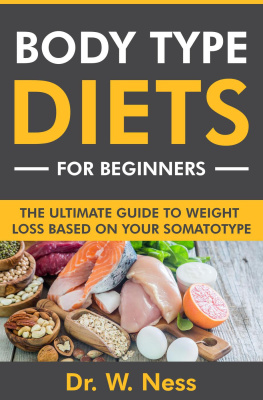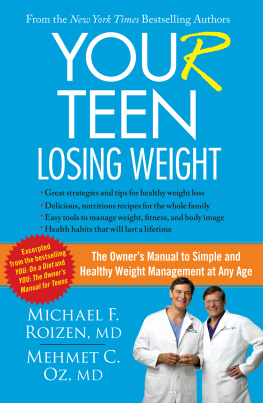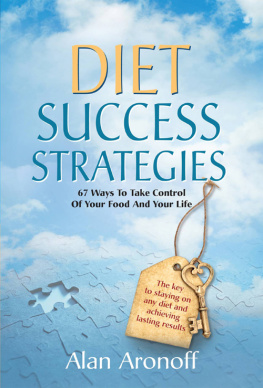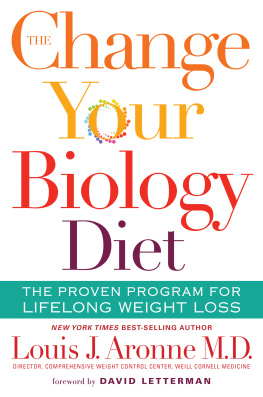Understanding Weight Control
Mind and Body Strategies for Lifelong Success
Deborah C. Saltman, MD, PhD

Copyright 2018 by Deborah C. Saltman, MD
All rights reserved. No part of this publication may be reproduced, stored in a retrieval system, or transmitted, in any form or by any means, electronic, mechanical, photocopying, recording, or otherwise, except for the inclusion of brief quotations in a review, without prior permission in writing from the publisher.
Library of Congress Cataloging-in-Publication Data
Names: Saltman, Deborah C., author.
Title: Understanding weight control : mind and body strategies for lifelong success / Deborah C. Saltman, MD.
Description: Santa Barbara, California : Praeger, an imprint of ABC-CLIO, LLC, [2018] | Includes bibliographical references and index.
Identifiers: LCCN 2017044438 (print) | LCCN 2017047066 (ebook) | ISBN 9781440857218 (ebook) | ISBN 9781440857201 (print : alk. paper)
Subjects: LCSH: Weight lossPhysiological aspectsPopular works. | Weight lossPsychological aspectsPopular works.
Classification: LCC RM222.2 (ebook) | LCC RM222.2 .S2365 2018 (print) | DDC 613.2/5dc23
LC record available at https://lccn.loc.gov/2017044438
ISBN: 978-1-4408-5720-1 (print)
978-1-4408-5721-8 (ebook)
22 21 20 19 18 1 2 3 4 5
This book is also available as an eBook.
Praeger
An Imprint of ABC-CLIO, LLC
ABC-CLIO, LLC
130 Cremona Drive, P.O. Box 1911
Santa Barbara, California 93116-1911
www.abc-clio.com
This book is printed on acid-free paper 
Manufactured in the United States of America
This book discusses treatments (including types of medication and mental health therapies), diagnostic tests for various symptoms and mental health disorders, and organizations. The authors have made every effort to present accurate and up-to-date information. However, the information in this book is not intended to recommend or endorse particular treatments or organizations, or substitute for the care or medical advice of a qualified health professional, or used to alter any medical therapy without a medical doctors advice. Specific situations may require specific therapeutic approaches not included in this book. For those reasons, we recommend that readers follow the advice of qualified health care professionals directly involved in their care. Readers who suspect they may have specific medical problems should consult a physician about any suggestions made in this book.
Contents
Preface
Who are you writing this book for? asked my best friend, who is also named Debra and who was the inspiration for this book. Debra had lost a total of 60 lb over four years through a variety of disruptive measures and was still losing more weight.
On that day, she was amazedand maybe amusedby what I had just done.
A clinical physician whos authored 10 books and has developed an expertise in weight management, I was, at the time of that conversation, a size 10 and had been for more than a decade. But I still felt like a size 18. We were on vacation, and I had just thrown out a perfectly good sweater because I thought the horizontal stripes on it made me look fat.
I actually said that out loud.
It wasnt looking in the mirror that was the angst-invoking challenge; it was the memory of me at size 18 wearing clothes with horizontal stripes.
But things have changed now, years later.
Memories of when I was a heavyweight only make me proud today of how much I have changed. It wasnt easy, and my weight management will certainly be a never ending, lifelong quest. But its a worthwhile venture. I am happy.
So, for whom is this book written? For people like me, who despise what their scales say or said and who, whatever our weight, always tend to see ourselves as fat. I hope sharing my story and the stories of people I have assisted will provide an ongoing, always helpful resource for everyone who reads it, an inspiration for every overweight or obese person seeking a long-term approach to weight loss.
Hopefully, this will be the one book about overweight and obesity on your Kindle, iPad, or bookshelf that is a keeper.
Acknowledgments
This book is dedicated to my family, in particular to my best friend, expert critic, and lovely sister Dr. Maureen Waine and to my wonderful brother-in-law Dr. Eric Waine. We have all struggled with weight together.
Many willing minds have helped me along the wayboth expert patients and expert clinicians. Thank you all. Here are just a few whom I can name: Natalie ODea, who helped me find the first ingredients, and Samantha Joel, a talented chef who taught me to cook up any number of different weight-loss diets. Of course, there is always a support teamProfessors Monika Thomas and Michael Kidd, Dr. Inge Okkes, Chris Moller, and Joan Fitzhenrywho never lost faith in my abilities.
Special thanks to Professor Julie Silver, who gave me the skills to write such a complex book, and to Debbie Carvalko, the most wonderful editor a writer could have, and to the production team: Bridget Austiguy-Preschel, Nitesh Sharma, and Fred Dahl.
Introduction
Obesity is not one disease but a number of interconnected diseases and problems that come about through the interaction between our genetic makeup and our environment. It runs in families. Between 25 and 40% of our weight is determined by our genes and what goes on in our cells. Genes influence not only the ways we take in nutrients and excrete them but also the way we store our fat. The rest of our predisposition to fat is dictated by environmental factors, such as our access to unhealthy food, the portion sizes we eat, and the ways we may use food as an emotional crutch.
Obesity and overweight are often used interchangeably because the same health risks are attached to both of them. I prefer to use the term overweight, which gives us an understanding that our weight is modifiable and relegates obesity to the extreme end of too much weight, often where drastic surgical intervention is necessary to achieve real change.
The degree of risk is greater the more overweight or obese we are. Body mass index (BMI) is the current measurement used to determine whether we are overweight or obese. BMI is calculated by dividing our weight in kilograms (kg) divided by our height in meters squared (m). The normal range for BMI is 18.524.9; overweight is 2529.9; obese is 30.039.9; and extreme obese is 40.
To calculate your own BMI, The Centers for Disease Control and Prevention has an easy-to-use BMI calculator (Adult BMI Calculator).
Changing our weight involves a lot of measuring to see how we progress; for example, we measure our weight, the calories (energy content) of what we eat, how long we undertake physical activity, and so on. The units used for the measurements depend on which side of the Atlantic you live. In the United States, ounces, pounds, inches, feet, and calories are the common measurements. However, a lot of the research is conducted in kilograms, grams, centimeters, meters, joules. It may be confusing, especially when reading articles or checking food content, so I have tried to include both sets of measurements here, wherever possible.
Up to 50% of dieters who reduce their weight to a healthy level put weight back on within five years, and the more we lose, the more likely most of us are to regain it.
Those reading this book have most likely lost weight at least once in their lives and have probably also bought several books and read hundreds of articles on weight loss, so they will be familiar with some of the terminology. We know that losing weight in the first place is not usually the main problem. No matter what we do, any proven weight-loss program will help us to lose at least 510% of our weight in the first six months. Up to 90% of us maintain that weight loss for between six and 12 monthsbut it doesnt last. That is why weight loss is big businessbecause so many of us need continual help to keep the weight off.
Next page

